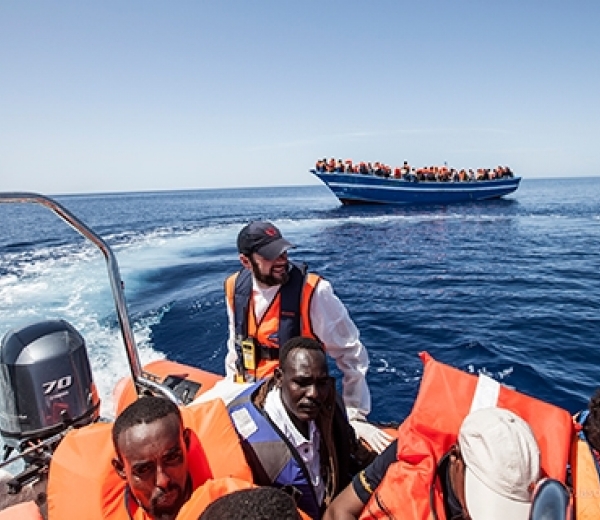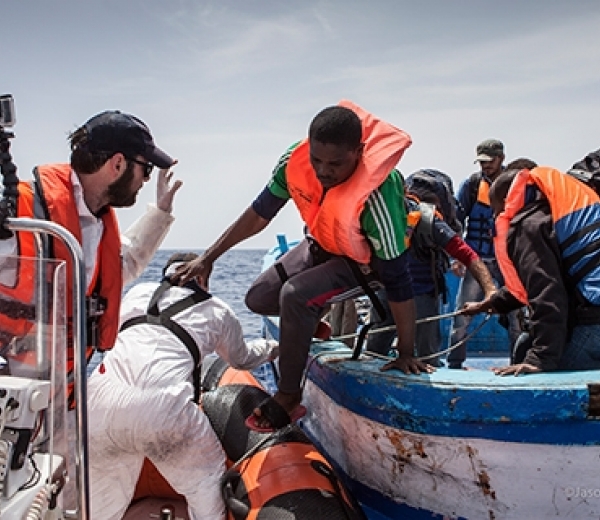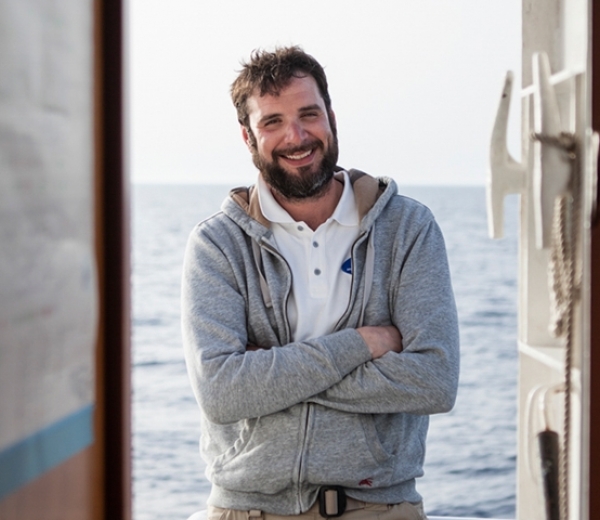Chris Catrambone: “Nobody deserves to die at sea”
Catrambone eventually found himself employed as an insurance investigator, dispatched to places as dangerous as Iraq and Afghanistan and the notorious New Orleans housing projects. Fast forward to 2006, when Chris founded the Tangiers Group. In ten short years, the company became a global business leader specializing in insurance, emergency assistance, on-the-ground claims handling and intelligence services. Today his company operates out of Valletta, the capital of the Republic of Malta.
A Man of Action
Catrambone, still in his 40s, has attracted the most attention for his amazingly quick and efficient response to the Lampedusa migrant tragedy, in which hundreds of migrants are believed to have drowned somewhere in between the Libyan coast and the Italian island. With his wife Regina Chris founded the Migrant Offshore Aid Station (MOAS) in 2014. The station employs a 40-meter-long drone-equipped ship called the Phoenix to assist migrants who are trying to cross the Mediterranean. Sometimes that means literally pulling people out of the water. Along with a crew of devoted volunteers and trained medical and rescue staff, MOAS has saved the lives of over 3,000 refugees.
Deeply impressed by Catrambone’s unique, hands-on approach to humanitarianism and the efficiency of his operations, we spoke to Chris about his motivations and goals, which can inspire anyone who wants to help others for the simple joy of doing the right thing. While entire governments have remained seemingly paralyzed by their inability to come to terms with the growing migrant/refugee crisis – perhaps the greatest humanitarian crisis to date in the 21sr century — Catrambone and his crew have demonstrated the power of conviction, ingenuity and quick action.
C.A.: What triggered your involvement in helping refugees in the Mediterranean and why did you establish MOAS? What is your organization’s long-term goal?
C.C.: My wife and I decided to start MOAS simply because we felt it made no sense for human beings, entire families, to drown at sea on their way to safety. We could not be indifferent any longer. The long-term goal is to spread this message around the world and beyond the Mediterranean. Nobody deserves to die at sea. We can't just turn a blind eye because these deaths happen where nobody sees them. We must do all we can to preserve the sanctity of life and bring people to safety wherever this is happening.

|
© Jason Florio, MOAS |
CA: Do you see yourself as a "normal" person who just has strong morals, or someone with an extraordinary sense of mission? Do you think your family upbringing or faith have contributed to your compassion toward others?
C.C.: I was lucky enough to have started a successful business at a young age. This allowed me to be welcomed wherever I went. However, it also made me aware of the different realities people live in. When you work in a conflict zone, you realize how many people out there do not have the same access to opportunity. So many people are fighting for survival. When I reached a certain level of success, I wanted to contribute that success to helping others. My faith obviously inspired this outlook.
C.A.: Why don’t more people do the type of work that you do to help others?
C.C.: A lot of people do and many of them are not seen doing it. MOAS has received donations from all over the world and from people from all walks of life. You don't have to be the one who buys a boat and saves refugees at sea. You could be the one who pays for the fuel or donates money for the life jackets. All these contributions are important. Naturally, there are other people who are still addicted to personal success and riches. What I tell these people is that they should really try to experience giving back, because it's infinitely more rewarding than taking.

|
© Jason Florio, MOAS |
C.A.: The Aurora Prize for Awakening Humanity was established to recognize those who help others to survive and thrive in memory of people who helped Armenians survive the Genocide 100 years ago. What is your take on this kind of initiative?
C.C.: These efforts are important because they give another platform for good work to shine through. Ultimately, every charitable initiative or success story is competing with many other pieces of negative news. Every effort to highlight work that is positive and good for society should be encouraged.
C.A.: What are some other humanitarian projects you are involved in or would like to be?
C.C.: My focus is on MOAS. However, I am very passionate about education in poor parts of the world. I have helped schools in Nepal, but I am constantly thinking of other ways to contribute to solving this global crisis. Ultimately, education is the key to alleviating poverty and putting an end to war.
C.A.: Who are your heroes?
C.C.: My heroes are people like Martin Luther King, Ghandi, Mother Theresa and Pope Francis – People who fought for human dignity during the dark times and brought back the light.
C.A.: In your blog, you encourage people to have very targeted, specific, achievable goals for their humanitarian projects. How can the average person who works an all-day desk job or a student with limited resources help to make a difference?
C.C.: To find time, you need to make time. That often means being more efficient or productive at work or at home. It means moving away from unproductive distractions. You need to be quite single-minded to achieve tough goals.
C.A.: How have you managed to accomplish so much in such a short period of time? Your company grew at lightening speed and MOAS developed very quickly as well.
C.C.: Mostly with the help of my wife and my family, but also by building excellent teams around every project and strongly believing in everything I do. I am good at persevering when I know I'm on the right path.

